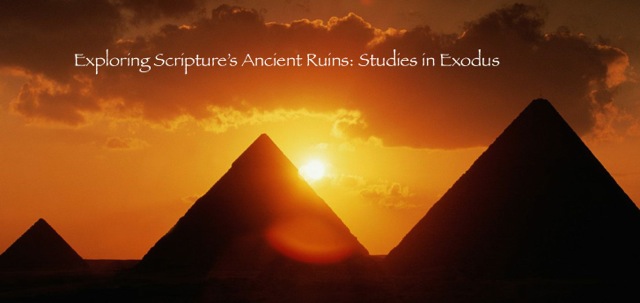
©1998-2015
Fellowship
Life of Moses
Lesson 20: A Simple Meal…
Ex 12:1-16 (17-20)
Orig. 4.1.203; Ed. 2.8.15
Introduction…
Interesting how meals play such a significant role in special occasions such as birthdays, anniversaries, Thanksgiving and Christmas. I suppose if we are going to eat, we might as well enjoy it, and therefore, food or meals or wonderfully prepared meals seem to play such a logical role in most special occasions.
Don’t you think it is interesting that a meal plays such an important role in Israel’s ultimate deliverance? Why do you think this is so? Why would God connect his greatest, most devastating and deadly plague to a simple sacrificial meal? How does this meal…the Passover…relate to our meal that commemorates our Lord’s sacrifice for sin?
Some interpret that the early church’s “breaking of bread, as described in Acts 2:42ff was actually their observing the Lord’s sacrifice—his broken body and shed blood–at every meal. If so, why do you think observing the Lord’s communion with them at every meal was so important to them? Could it possibly have had anything to do with that they might have been thinking that his return to establish his earthly kingdom was imminent? Therefore with every meal, they were expressing their hope that their Savior was about to return and be with them again? And yet, as we know, this turned out not to be God’s plan? Why not? So that the message of his story would expand to the utter most parts of the world and that others would also be allowed to share in this most meaningful and yet simplest of meals?
The Bigger Picture of Israel’s Miraculous Exodus from Egypt: Between Exodus chapters 3 through 14…
• Moses makes 12 appearances before Pharaoh.
• There are 39 mentions of Israel’s “release” or “deliverance” in order to celebrate a festival to Yahweh God in the desert.
• There are 10 Consecutive, Pervasive and Devastating Curses are Unleashed upon Egypt.
• 10x the text clearly says that Yahweh God distinguishes between Israel and Egypt with respect to the plagues’ devastating affects.
• Neither Pharaoh’s diviners nor his gods are any match for Yahweh’s mighty hand.
In delivering Israel from Egypt, Yahweh God could be defeating as many as 118 Egyptian deities.
http://en.wikipedia.org/wiki/List_of_Egyptian_deities
It is also interesting to note that Yahweh’s last and greatest curse against Egypt, the curse of Egypt’s firstborn, is not just directed against the firstborn of man and beast, but also “against all the gods of Egypt” (Ex. 12:12).
In Moses’ Song of Deliverance after the salvific crossing of the Red Sea, he will ask, “Who is like you among the gods, O Yahweh?” (Ex. 15:11).
Later, when Moses is met by his father-in-law, Jethro, in the wilderness, where Moses first received his commission by Yahweh to administer Israel’s deliverance from Egypt, Jethro will bless Moses with these words: “Now I know that Yahweh is greater than all the gods” (Ex. 18:11).
And beginning with Ex. 20:2ff when Yahweh and Israel ratify their covenant together as God and nation, Yahweh makes it perfectly clear to Israel 9 more times just in the book of Exodus, your worship of me is exclusionary:
I am Yahweh your God, who brought you out of slavery in Egypt. Unlike, Egypt, you shall have no other gods before me; nor shall you make any idols for yourselves, and you shall certainly not worship them for I am a jealous God, and you have just seen how easily I was able to humble and humiliate the greatest nation on the planet and its semi-divine leader. Believe you me, I will not spare my rod of discipline for your disobedience to my covenant–upon you who have seen my grace–for at least four generations to come.
• Under intense national pain and pressure, on several occasions, Pharaoh will express a momentary remorse and contrition for not releasing Israel to worship.
Pharaoh is momentarily contrite (3x) while admitting sin (2x) and asking Moses to prayerfully intercede on behalf of Pharaoh’s disobedience to Y. for not releasing the Israelite as commanded by Y. in order that they may fully serve Y. God in the desert with sacrifices (4x); Once Pharaoh even asks for forgiveness.
• 7x Pharaoh will declare that Israel can go and sacrifice (after plagues 2, 4, 7, 8, 9 [2x]; 10);
• But because of the hardening of his heart, Pharaoh will change his mind and recant his promise 4x;
• 4x Pharaoh unsuccessfully attempts to make bargain with God or Moses so that not all of Israel will go and worship.
• At the same time, there are 17 references to the “hardening” of Pharaoh’s heart.
Moses makes mention of this “hardening” a total of 17 times, with 9 references being attributed directly to Yahweh’s divine intervention, 6 neutral occurrences, which could be inferred to as being attributed to Yahweh and 3 more occurrences in which Pharaoh and his servants are given the credit of “hardening” their own hearts.”
• 7 times Yahweh predicts that Pharaoh will not listen.
So what’s the point to all this protracted salvific drama?
Undisputed Truth about both man’s Mighty Creator and the Creator’s fickle creature.
What’s the point to all of this back and forth “repenting” for not releasing Israel and then changing her mind again not to “release” Israel?
Perhaps there are several reasons, two of which are: 1) whether influenced by God or not, the obvious fickleness and stubbornness of man’s fallen, sinful will. To one degree or another, don’t we all go back and forth in our thinking, feeling and behaving? We believe pain has taught us, but once the pain has subsided and goes away, seemingly, we must make sure that the pain we suffered was a really a consequence of our behavior, and so, we must repeatedly learn our painful lesson again and again, until we are finally crushed and left with no other conclusions nor any other means of escape or rationalization.
As fallen, deceitful creatures, we can be very obstinate in our willingness to truly learn who is really in charge and who is really our salvation. So it was with Pharaoh, who, blinded by centuries of handed wealth and power, never seemed to fully accept or embrace who was really in charge.
2) Yahweh tells Moses, before and during the unleashing of the plagues, that “I will harden Pharaoh’s heart that I may multiply my signs and wonders in the land of Egypt, and when Pharaoh refuses to listen, I will lay my hand on Egypt and bring out…my people the sons of Israel” (7:2-3; 11:9-10).
“The Egyptians shall know that I am I AM (Yahweh) and that there is no one like me in all the earth. For if by now I had put forth my hand…, you would have been cut off from the earth, but for this reason I have allowed you to remain—to show you my power and in order to proclaim my name through all the earth” (9:14-15).
In other words, the greater Egypt’s resistance, the greater her defeat and the greater, her overcomer, Yahweh God.
Finally, when Pharaoh’s pursuing cavalry is about to be utterly annihilated, Yahweh declares, “I will be honored through Pharaoh and all his army, and the Egyptians will know that I AM is that one God that truly exists, and not man’s many gods (14:3, 17).
Summary…
So with this one protracted drama acted out on history’s stage, God reveals the truth concerning God and man. God is big; man is small. Though for a time, it may seem that man can be God, when man attempts to play God, he is ultimately crushed by God, and those who chose to keep God God and man man, or those that ally themselves with God through faith, with will not only be delivered from corrupt man, but will be rewarded for their trust.
Thanks,
Your servant,
Joe Continue reading →


